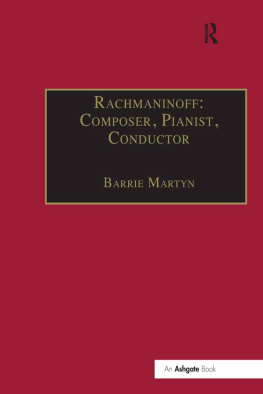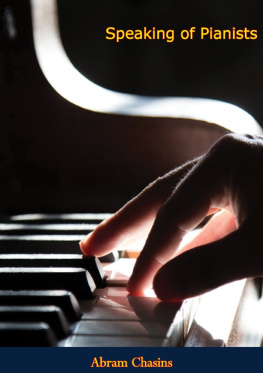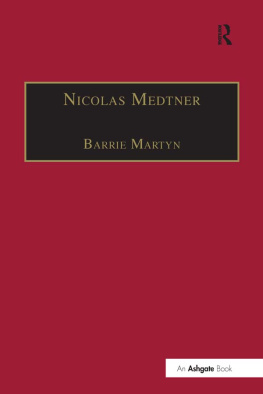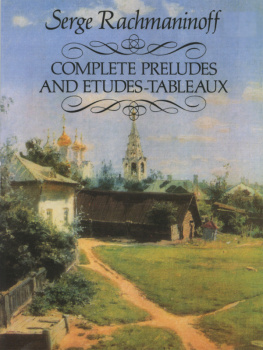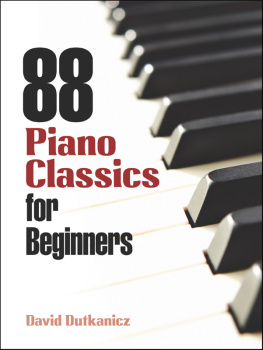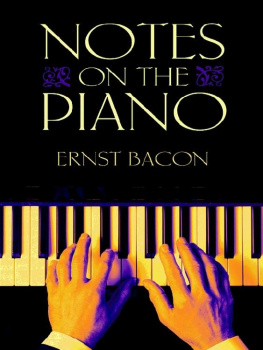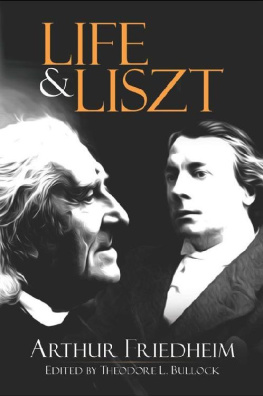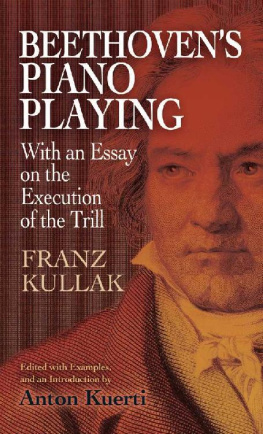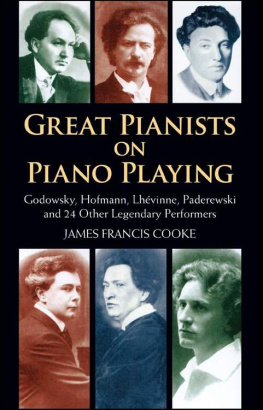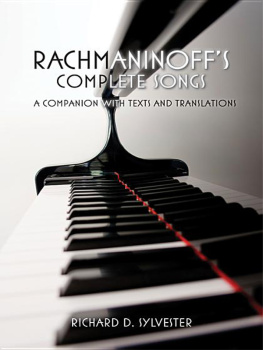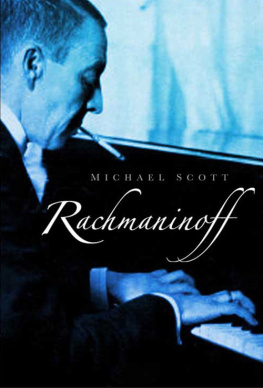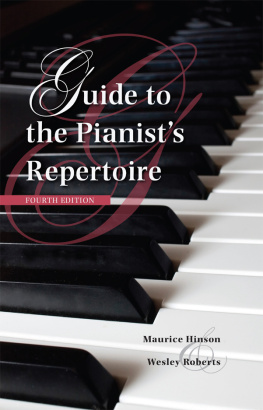
RACHMANINOFF
Composer, Pianist, Conductor
For Kate
First published 1990 by Ashgate Publishing
Published 2016 by Routledge
2 Park Square, Milton Park, Abingdon, Oxon OX14 4RN
711 Third Avenue, New York, NY 10017, USA
Routledge is an imprint of the Taylor & Francis Group, an informa business
Barrie Martyn, 1990
All rights reserved. No part of this book may be reprinted or reproduced or utilised in any form or by any electronic, mechanical, or other means, now known or hereafter invented, including photocopying and recording, or in any information storage or retrieval system, without permission in writing from the publishers.
Notice:
Product or corporate names may be trademarks or registered trademarks, and are used only for identification and explanation without intent to infringe.
British Library Cataloguing in Publication Data
Martyn, Barrie
Rachmaninoff: composer, pianist, conductor.
1. Russian Music. Rachmaninoff, Sergei 18731943
I. Title
780.924
Library of Congress Cataloging-in-Publication Data
Martyn, Barrie
Rachmaninoff: composer, pianist, conductor / Barrie Martyn
p. cm.
ISBN 0859678091
1. Rachmaninoff, Sergei, 18731943. 2. ComposersSoviet Union Biography. I. Title.
ML410.R12M17 1990
780.92dc20
[B]8924085
ISBN 13: 978-0-8596-7809-4 (hbk)
Contents
Between pages 112 and 113
Between pages 272 and 273
Between pages 400 and 401
I am indebted to the copyright holders of textual matter quoted with their permission:
Angus & Robertson (UK) (for extracts from Duet for Three Hands by Cyril Smith);
The BBC and Miss Phyllis Sellick (for a quotation from a broadcast by Cyril Smith);
Bertelsmann Music Group (for quotations from sleeve notes to RCA Red Seal recordings);
Jonathan Cape Ltd (for quotations from My Many Years by Arthur Rubinstein);
William Collins Sons & Co. Ltd (for a quotation from Sir Thomas Beecham by Neville Cardus);
Dobson Books Ltd (for a quotation from Sergei Rachmaninov by John Culshaw);
Faber & Faber Ltd (for a quotation from Music Ho! by Constant Lambert);
Victor Gollancz Ltd (for a quotation from My Life of Music by Sir Henry Wood);
Hall Concerts Society (for a quotation from Hall, No. 117);
Hamish Hamilton Ltd (for a quotation from At the Piano by Ivor Newton);
Harrap Ltd (for an extract from The Selective Ego by James Agate);
The Instrumentalist Co. (for quotations from Clavier, October 1973 articles by Olga Conus, Gina Bachauer and Ruth Slenczynska);
Miss Constance Keene (for quotations from her late husband Abram Chasins book Speaking of Pianists);
Alfred A. Knopf Inc., New York (for extracts from The Other Side of the Record by Charles OConnell);
Macdonald & Co. Ltd (for quotations from Chaliapin, An Autobiography as told to Maxim Gorky, translated by Nina Froud and James Hanley, and Horowitz, A Biography by Glen Plaskin);
Macmillan & Co. Ltd (for an extract from Eric Bloms article on Rachmaninoff in the fifth edition of Groves Dictionary of Music and Musicians);
Miss Tanya Moiseiwitsch (for two quotations from radio broadcasts by her father Benno Moiseiwitsch);
The editor of Musical Opinion (for a quotation from an article by Clinton Gray-Fisk in the April 1943 edition of that magazine);
The editor of New Statesman (for a quotation from NS, 25 February 1966);
Orpheus Publications (for two quotations from Music & Musicians International);
Oxford University Press, Journals Department, New York, (for quotations from The Musical Quarterly, January and May 1944);
The editor of Tempo (for a quotation from an article by Serge Moreux in the Spring 1949 edition of that magazine);
University of South Carolina Press (for quotations from The Amazing Marriage of Marie Eustis and Josef Hofmann by Neil S. Graydon and Margaret S. Sizemore);
University of Minnesota Press (for a quotation from Music and Maestros, The Story of the Minneapolis Symphony Orchestra by John K. Shermann).
Thanks are due to those music publishers who have kindly given permission to reproduce extracts from their copyright scores:
Edwin Ashdown Ltd, London ();
Boosey & Hawkes, Music Publishers Ltd ();
CPP/Belwin Inc. and International Music Publications for Belwin Mills Publishing Corp. (Filmtrax PLC), original copyright owner for the world ();
Richard Schauer (Anton J. Benjamin), London and Hamburg ();
Rob. ForbergP. Jurgenson, Musikverlag, 53 Bonn ().
Sources and permissions for the photographic illustrations are as follows:
Collection Author: 14, 24;
Kunstmuseum Basel (Depositum der Gottfried Keller-Stiftung): 10;
Novosti Press Agency: 1, 2, 6, 8, 9, 23;
Paul Popper Ltd: 21;
RCA Victor Red Seal: 17, 22;
Society for Cultural Relations with the USSR: 35, 7, 11, 13, 18, 19;
Topham Picture Library: jacket, 15, 16, 20.
Messrs. Boosey & Hawkes, Music Publishers Ltd, own the copyright to the music illustrated in .
Every effort has been made to contact all copyright holders of material reproduced in this book. The publishers will be pleased to hear from any whom they have been unable to locate and undertake to insert any missing acknowledgements in future editions.
Like all Gaul, the musical life of Sergei Vasilyevich Rachmaninoff was divided into three parts: composer, pianist and conductor; so too this book. The first and main part considers Rachmaninoffs activity as a composer, with a chronological survey of his output; the second and third parts comprise materials concerning his careers as a virtuoso pianist and conductor. In 1930, reviewing his lifes work with characteristic modesty and scepticism, Rachmaninoff remarked:
Today, when the greater part of my life is over, I am constantly troubled by the misgiving that, in venturing into too many fields, I may have failed to make the best use of my life. In the old Russian phrase, I have hunted three hares. Can I be sure that I have caught one of them?
It is the authors contention that in each of his three careers Rachmaninoff not only caught his hare but achieved greatness.
Both as man and musician Rachmaninoff is a fascinating enigma and paradox, particularly for those of us in the West, where he spent the final twenty-five years of his life. During this time the enormous celebrity of his name as a composer reflected neither his reputation among generally hostile critics nor an admiring publics almost total unfamiliarity with most of his output. At the same time the place in musical history he seemed destined to be assigned alongside his countrys nineteenth-century predecessors was manifestly irreconcilable with the chronology of the life of a man only one year older than Schnberg. In contrast with the extremes of emotion so powerfully and uninhibitedly expressed in his music, the private life that Rachmaninoff so carefully protected may now be seen, at least on the surface, to have been sober, even mundane, albeit with the trappings of material success and with endearing personal quirks, such as his typically twentieth-century passion for speed and the pleasure he evidently took in observing an intriguing game of poker or charades. Although in his music he wore his heart on his sleeve, except among intimates Rachmaninoff the man was always reserved, often aloof, sometimes unapproachable. Not only did his inscrutably impassive facial expression give nothing away about his inner feelings, but he lacked the vices of egotism and indiscretion that might otherwise have broken down the barriers of reticence in his correspondence; even his wife never knew what he was composing, and this whole subject was taboo in the family circle. Although he had the world at his feet, the insecurity and self-doubt which had afflicted him near the beginning of his career after the traumatic failure of his First Symphony persisted not far below the surface throughout his life, belied by a towering physical presence and a commanding personality. At concerts he gave the impression of coming on to the stage only with the greatest reluctance and yet, at least in his later years, he used to declare that performing in public was his one satisfaction in life. No-one will ever know the price he must have paid for the battle within himself to present a front to the world that concealed his soul; the only clues are in the music, for it was here that Rachmaninoff expressed his innermost thoughts with absolute directness and sincerity.
Next page
